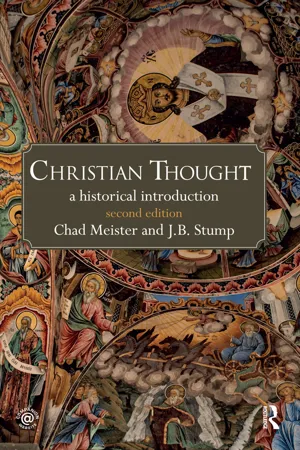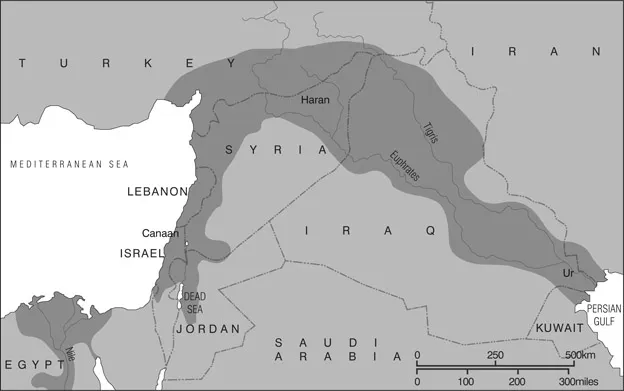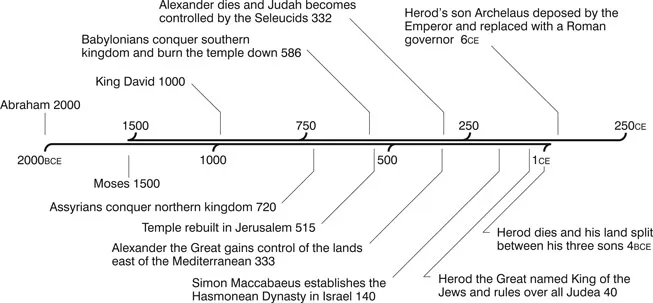Christian thought began in the third or fourth decade of the first century of what is now known as the Common Era (CE). This is when Jesus of Nazareth – later known as Jesus Christ – began his career of public teaching. But before beginning the story of Christian thought, some attention to its context will be prudent. Even if Jesus was “God come to earth in human form” as most Christians believe, he came at a specific time and to a specific place in world history. His thought – and perhaps even more so, the thought of his followers – was conditioned by a definite context that included geographical, political, cultural, and intellectual factors. Having at least a cursory overview of this context will prove helpful in trying to understand the thought that sprang from it. The three civilizations which had converged at the time of Christ in a stretch of land along the eastern shore of the Mediterranean Sea are most relevant in this respect: the Hebrews, the Greeks, and the Romans.
How far back do we need to go in order to understand the context? We stand now at some 2,000 years after the time of Christ; it is for more than symmetry’s sake that we’ll start just as far on the other side of the timeline.
1 Hebrews
According to Hebrew tradition, sometime around the dawn of the second millennium before Christ – a milestone which, of course, would have meant nothing at the time – a family group set out from Ur for the land of Canaan. We don’t know why Terah, the patriarch of the group, decided to do this. Ur was probably the largest city in the world at that time, and was situated in the fertile crescent of ancient civilization. And Terah couldn’t have known much about Canaan except that it was peopled with barbarian nomadic tribes. At any rate, after traveling close to 1,000 kilometers northwest up the Euphrates, Terah, his son Abram, and his grandson Lot (who was Abram’s nephew) settled at Haran in what is now Turkey. There Terah died, and the prospering family was left in Abram’s charge.
Map 1.1 The Fertile Crescent and modern boundaries
They must have stayed in Haran for a while, because when the voice of Yahweh (their God) came to Abram, it told him to leave what had become his country and his people and go to a new land. This time we understand the motivation for uprooting, because Yahweh promised:
I will make you into a great nation and I will bless you;
I will make your name great, and you will be a blessing.
I will bless those who bless you,
And whoever curses you I will curse;
And all peoples on earth will be blessed through you.
(Genesis 12:2–3)
So with this promise in mind, Abram left Haran and eventually settled in Canaan, some 650 kilometers southwest toward the Mediterranean.
Yahweh
The transliterated name for the one God of the Hebrew people. Sometimes this is rendered in English as “Jehovah,” and usually translated in the Old Testament scriptures as “THE LORD”.
Once there, Yahweh spoke to him again, spelling out the details of the covenant. Abram’s name was changed to Abraham, meaning “father of many.” It must have been awkward to tell the neighbors his new name, since Abraham and his wife Sarah were childless and beyond the age of being able to do anything about that. But Abraham believed Yahweh. More tangibly at the moment, he was also given the land of Canaan as an everlasting possession to his people. For Abraham’s part of the bargain, he had to acknowledge Yahweh as the one and only God and to circumcise all male descendants as the mark of their fidelity.1
So were born the Hebrew people and the Israelitic tradition from which Judaism later developed.2 The next parts of the story are known to most people educated in the Western tradition: the promised heir Isaac was born to Abraham and Sarah in very old age and nearly sacrificed on an altar by Abraham; Isaac fathered the twins Esau and Jacob; Jacob’s son Joseph was sold into slavery by his brothers, but then rose to prominence in the court of Egypt where he brought the whole family to live during a time of famine; later Egyptians would enslave the growing Hebrew population until they were led out of their bondage in a mass exodus by Moses; they crossed the Red Sea, received the Ten Commandments, and wandered in the desert for forty years; Joshua led the charge across the Jordan River back into Canaan and fought the battle of Jericho, where the walls came tumbling down, and the Hebrews took possession of their promised land once more. Eventually, the Hebrew nation was ruled by a series of kings, beginning with Saul, then more famously David and his son Solomon.
Of course the details of many of these events are sketchy and accessible to us only through the lenses of the Hebrews themselves and their oral traditions, which were eventually written down. Quibbling over the historicity of these won’t concern us here, though, since the distinctively Hebrew ideas that are important elements of the context of Christian thought emerge from this story whether it happened precisely as recounted or not. Among these distinctively Hebrew ideas are the following:
- Monotheism: There is one God, Yahweh. Other nations worship other “gods,” but these are false gods. Perhaps these others have some limited power, but Yahweh is the only supreme being, the creator of all that is, and the only one who should be worshiped.
- Election: Yahweh singled out the Hebrew people through Abraham to have a special covenant relationship with him. They were to be blessed and would prosper in the land that was given to them. Eventually, all people of the earth would be allowed to participate in the permanent kingdom that God would establish through the Hebrew people.
- Righteousness: Yahweh seems to be unique among the gods of all known ancient civilizations in that the righteousness he demanded went beyond an ethic of justice. In the stories of other gods, they merely wanted to be respected and treated well, but Yahweh intended for his people to be holy and just, to be humble, to be compassionate – moral demands that were defined by his character and the law he gave them and that were expected to be obeyed.
Timeline 1 The pre-history of Christian thought
At the height of the Hebrew civilization under King Solomon, the law was obeyed and the people prospered. A magnificent temple was built where Yahweh was worshiped. But in the ensuing generations, the people did not always follow the ways of their ancestors. Prophets tried to call them back to the way of righteousness, predicting that Yahweh would withdraw his hand of blessing from them if they didn’t turn from their evil ways. The lure of present earthly power, though, was more tempting than some utopian ideal passed down in bedtime stories. Rivals vied for control of the kingdom, and it was split into two parts: the northern kingdom of Israel and the southern kingdom of Judah.
The kings of Israel led the people further away from Yahweh and his expectations for them. So, as the prophets predicted, Yahweh removed himself from their land. Around 720BCE, the Assyrians conquered this northern kingdom and exiled most of its inhabitants. Their land was resettled by several ethnic groups who intermarried with the remaining Hebrew peasants, and these people became known as the Samaritans.
The southern Kingdom of Judah with its capital city of Jerusalem lasted longer. But some of the Judahite kings also turned from following Yahweh, and Judah was conquered by King Nebuchadnezzar of Babylon in 586BCE. Most devastatingly, he plundered the treasures of the temple and burned the temple to the ground. The Judean elites were also carried off to Babylon as slaves and kept in exile there for two generations until the Babylonians were conquered by King Cyrus of the Persians. While making it clear that the land was under his dominion (there would be no king in Judah), King Cyrus encouraged the Hebrew people to return to their homeland in 538BCE.
Rebuilding the temple in Jerusalem was tremendously important for Jewish religious life.3 This was completed in 515BCE, and the period of Jewish history known as Second Temple Judaism began. Priests continued to occupy themselves with the rituals associated with the temple, but in the absence of a monarchy, a new class of religious leaders known as Pharisees came to prominence in Jewish culture. Pharisees, who figure prominently in the Gospels, emphasized study of the Torah and believed that Jewish identity was to be preserved by strict adherence to the law.
The Old Testament book of Nehemiah recounts the story of rebuilding the wall around Jerusalem. This took place around 445BCE during the time that Artaxerxes I was king of the Persian Empire. Judah, as a province of that empire, was markedly insignificant in global terms. It extended no more than 20 miles in any direction from Jerusalem, and would not have appeared much different from the numerous other temple-states in the empire.4 There was another culture, however, which successfully resisted assimilation by these same Persians and stood out as few have in the history of the world. The Greeks of the fifth century CE were enjoying their golden age.
Torah
The Jewish law as contained in the first five books of the Old Testament: Genesis, Exodus, Leviticus, Numbers, Deuteronomy.
Pharisees
A sect which developed out of the scribes and sages during the Second Temple period of Judaism. Pharisees emphasized strict adherence to the Law even while Jewish culture was being assimilated by the Alexandrian and then Roman Empires.
2 Greeks
It is difficult to avoid superlatives when describing the people and accomplishments of ancient Greece. Historian Michael Grant calls it, “the most wonderful civilization in the world’s history,” and claims that, “never in the history of the world has there been such a multiplication of varied talents and achievements within so limited a period.”5 Athens, in just the fifth century, boasted some of the world’s most impressive and important figures not only of their time, but of all time. They founded and developed disciplines that were the wellspring of Western civilization: drama (Aeschylus, Sophocles, Euripides, and Aristophanes), poetry (Pindar); history (Herodotus, Thucydides); sculpture and architecture (Phidias, Polyclitus); philosophy (Parmenides, Socrates, Plato); medicine (Hippocrates); politics (Pericles); military strategy (Themistocles). As a comparison, it would be as though Shakespeare, Dante, DaVinci, Michelangelo, Eiffel, Picasso, Descartes, Kant, Jefferson, Napoleon, and Einstein were all living at the same time in a city of about 100,000 people.
This is not the place for a full discussion of the history and influence of Greek thought, but we must mention some of the ideas originating in ancient Greece which proved to be very influential for Christian thought as it was developing during the first centuries:
- Rationality: The Greeks emphasized reason and rationality much more than the Jewish people did. Greek thinkers found themselves in a world that needed to be figured out – why things were the way they were, and how they could be understood.
- The real existence of an intelligible world: Contrasted with the world that is immediately apparent to the senses, there is a realm that is only to be comprehended by reason. Plato, for example, illustrated this with ideal “objects” like mathematical constructs and, most famously, the Forms from which the visible world is b...


